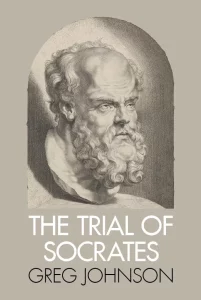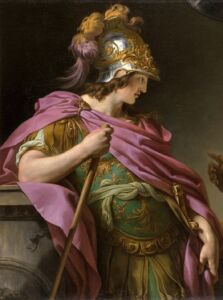Notes on Plato’s Alcibiades I Part 3
Part 3 of 5 (Part 1 here, Part 2 here)
In the second part of this series, Socrates shows Alcibiades that he doesn’t know what justice is, so he should not be too eager to get involved in politics. He needs to get educated beforehand. But Alcibiades thinks he’s found a way around Socrates’ argument. Granted, he doesn’t know what justice is. But politics doesn’t really deal with justice (δικαιοσύνη). It deals with the expedient or advantageous (συμφέροντα). The just and the expedient are different things, since one can benefit from unjust acts and be harmed by just acts.
Socrates suggests the example of a man who suffers injury or death by risking his life to save his kinsmen or countrymen in battle. This is a just and courageous act, even though one is harmed by it. Conversely, if one avoids injury or death by being cowardly, one is benefitted by injustice. Therefore, the just and the advantageous are different things.
It is important to note that this example operates within a definition of justice that Socrates rejects in the Republic: justice as helping one’s friends and harming one’s enemies. It is also important to note that just a short time after the setting of this conversation, Socrates risked his life to save Alcibiades at the battle of Potidaea.
The difference between justice and expediency was a commonplace idea in ancient Greece. Socrates deals with just such claims at length in the Gorgias and the Republic, where he takes great pains to argue that, properly understood, there is no distinction between justice and expediency. But these arguments depend on two premises: (1) the distinction between the soul (ψυχή) and the body (σῶμα); and (2) the superiority of the soul over the body, meaning that our true self is the soul, not the body.
For Socrates, the soul is perfected by virtue and marred by vice. Therefore, when a man suffers death or injury while acting courageously, his body may be harmed but his soul is benefitted, and the soul is the most important part. (This argument need not assume that the soul survives the death of the body.) Conversely, if a man prolongs his life through dishonest acts, he sacrifices something of greater value (his soul) for something of lesser value (his body). However, Socrates does not make this sort of argument, because the concept of the soul has not been introduced at this point in the Alcibiades I.
Socrates challenges Alcibiades to prove that he knows that the just and the expedient are different. Alcibiades hesitates, but Socrates presses the argument. If Alcibiades proposes to stand before the assembly and speak about the just vs. the expedient, then there is nothing to stop him from standing before Socrates and saying the same things. After all, a mathematician can persuade one man or many about numbers.
Alcibiades accepts this argument, but he is too hasty. Is it really true that the same things can be taught to one man or many? Doesn’t this presuppose that the audience is all basically equal? Doesn’t this undermine the need for distinguishing between exoteric and esoteric forms of speech? Obviously, some things that can be taught to intelligent individuals cannot be taught to large crowds, which contain people of different levels of intelligence. Socrates, being a tougher sell than the assembly, might be much harder to persuade. Such objections do not, however, occur to Alcibiades, who instead accuses Socrates of being hybristic. This is odd, because Socrates is actually placing himself on the level of every other Athenian. But Alcibiades is merely objecting to being defeated in argument.
Socrates proposes to persuade Alcibiades that the just and the advantageous are the same. Again, Alcibiades wants a speech, but Socrates insists on a dialogue. Socrates first establishes that Alcibiades thinks, “Of the just things, some are advantageous and some not” (115a). Socrates wishes to argue that justice is always advantageous.
First Socrates establishes the premise: “All the just things are also noble [καλόν]” (115a). Then Socrates establishes that Alcibiades holds that “some noble things are bad [κακός]” and “some shameful [αἰσχρός] things are good [ἀγαθός]” (115a). Socrates illustrates the “noble but bad” with the example of the courageous man who goes to the aid of his comrade in battle and suffers wounds or death. An example of the “shameful but good” would be the coward who saves his own skin by leaving his comrade behind.

You can buy Greg Johnson’s The Trial of Socrates here.
But Socrates points out that “Coming to the aid of friends is not . . . noble and bad in the same respect . . . “ (115c). It is morally noble, but physically disadvantageous. Likewise, abandoning one’s friend might be morally ignoble, but physically advantageous.
At this point, Socrates has set the stage for distinguishing between the soul and the body. We can be both noble and suffer at the same time, but not in the same respect. Part of us is noble, and a different part of us suffers. The soul can be noble or ignoble. The body suffers or is spared physical death or wounds. But Socrates does not introduce this distinction until later in the dialogue.
Socrates, however, turns to the question of whether courage is good or bad. He asks Alcibiades if he prefers good things for himself or bad. Alcibiades, of course, prefers the good; indeed, the best (115c). This is standard Socratic ethics, the thesis that “All men pursue the good.” Having established that Alcibiades wants the best for himself, Socrates asks him about courage (ἀνδρεία): “For what price would you be deprived of it?” (115d).
Alcibiades replies, “I wouldn’t choose to live if I were a coward” (115d). To which Socrates replies that cowardice (δειλία) is equal to death; that “life and courage are most opposed to death and cowardice” (115d); and that “courage is among the best things . . . and death among the worst” (115e). Alcibiades agrees with all of these claims.
But, again, this seems hasty. By saying that death is one of the worst things, Socrates implies that death is never choiceworthy, since we always choose the best option available to us. But Alcibiades has already said that he would choose death over dishonor if forced to choose between the two.
Socrates continues by asking if Alcibiades thinks that rescuing one’s friends in battle is noble because it produces good effects by means of courage. Alicbiades agrees. Then Socrates asks if it is also bad because it produces the bad effect of death. Alcibiades agrees with this as well. Socrates then establishes the premise that either act — rescuing or failing to rescue — might be deemed good if it produces good results, or evil if it produces evil results. Alcibiades agrees with that as well. Then Socrates proposes a surprising conclusion: “Then in saying that the rescue of one’s friends in battle in noble and yet evil, you mean just the same as if you called the rescue good but evil” (116a).
Socrates seems to be claiming that Alcibiades has contradicted himself. But has he? Hasn’t Socrates already provided an answer to this sort of objection? Is rescuing one’s friend good and evil in the same respect? Why not say that rescuing one’s friend is good because courage perfects the soul, but it is also evil because of the wounds or death suffered by the body?
Socrates then offers a summary: “So nothing noble, in so far as it is noble, is evil, and nothing base, in so far as it is base, is good” (116a). But to say that nothing noble is evil, just insofar as it is noble, does not rule out the possibility that a noble deed might lead to evil consequences, like dying in battle while rescuing a friend. And to say that nothing base is good, just insofar as it is base, does not rule out the possibility that it has good consequences, for instance that cowardice might prolong one’s life.
The final phase of Socrates’ argument at 116c–d is somewhat jumbled and difficult to follow. This is my reconstruction:
- “Whoever does nobly, does well [ευ πράττειν] . . .”
- By acting nobly and well, we acquire good things.
- By acquiring good things, we attain well-being or happiness (εὐδαιμονία).
————————————————–
Therefore, those who act nobly, enjoy well-being.
The trouble with this argument is that there is no guarantee that by acting nobly and well, we will acquire the external good things that Socrates says lead to well-being. Beyond that, we can think of many cases in which we can secure external goods by acting ignobly and badly. This is why the Greeks distinguished between expediency and justice (and all the other virtues). The only way to argue that there is a necessary connection between virtue and well-being is to make virtue itself a sufficient condition for well-being, regardless of external goods. Socrates makes such arguments in the Gorgias and Republic, but not in the Alcibiades I.
Socrates continues:
- “Noble and good are the same thing.”
- The just things are noble.
———————————–
Therefore, the just things are the same as the good things.
- The good things are the same as the just things.
- The good things are advantageous.
——————————————-
“Hence the just things, Alcibiades, are advantageous.”
But the conclusion does not follow with necessity, because, based on the examples we have examined, sometimes acting justly leads to bad consequences, and sometimes acting unjustly leads to good consequences. Alcibiades should reject this argument, but he agrees.
If the just is the expedient, and Alcibiades does not know the just, then Alcibiades is again in no position to advise anyone about politics, whether they be the Athenians or Peparethians. Peparethus was a tiny island off the coast of Thessaly. If Athens is the most important place in Greece, Peparethus might be the least. It was the Greek equivalent of Podunk or Peoria: the paradigm of provincialism. We don’t know if “Peparethus” sounded funny to the Athenians. But if it did, Plato’s contrast might be the equivalent of contrasting Washington, DC with Walla Walla. (Some classicists think they can date the composition of Alcibiades I to when Peparethus was “in the news.” But that would undermine the whole contrast. The point is that Peparethus is not famous at all.)
Alcibiades’ Plight
Alcibiades is quite distressed. He felt he knew what justice is, then Socrates changed his mind. He felt he knew what expediency is, then Socrates changed his mind. Socrates argues that we don’t change our minds about things that we actually know. If we change our minds about something, that is a sign that we don’t know it. This is a version of the earlier argument that disagreement (in this case, disagreement with oneself) is a sign of ignorance. But this is a false premise, because it is one thing to know something, another to put it into words, and just as two people who know the same thing might say it differently, the same person might articulate the same knowledge in different ways at different times.
Not only do we not contradict ourselves on matters that we know, Socrates argues that we don’t contradict ourselves on matters about which we know that we are ignorant. We only contradict ourselves on matters that we mistakenly think that we know about, but we actually don’t. Ignorance is not the problem. The real problem is ignorance of our own ignorance. When we know that we are ignorant, we simply defer to those who know. When we don’t know that we are ignorant, we make fools of ourselves by talking about things we do not know.

You can buy Greg Johnson’s From Plato to Postmodernism here
Alcibiades is not just ignorant. He’s not just ignorant of his ignorance. He’s also ignorant of the most important things: “the just, noble, good, and advantageous” (118a). Socrates sums it up bluntly: Alcibiades is guilty of “stupidity . . . in its most extreme form” (118b). At this point, Alcibiades takes the need for education seriously, and he is ready to follow Socrates as his teacher.
But Socrates does not close the deal. Instead, he overdoes it. He gets hubristic. He decides to gild the lily, to lay on the paint a bit too thickly. And in overreaching, he almost loses Alcibiades.
Socrates’ mistake is to point out that Alcibiades may be stupid, but he’s in good company. Most of the statesmen of Athens are clueless about justice, too, perhaps even Pericles.
Alcibiades points out that Pericles actually sought the counsel of wise men: Pythocleides, Anaximander, and Damon. Anaximander was a natural philosopher. In the Phaedo, Socrates admits to reading him avidly when he was younger, only to be disappointed (Phaedo, 97b–99d). According to Protagoras, Pythocleides was a wise man who disguised his wisdom as music (Protagoras, 317e). He was a teacher of Pericles and Sophocles. Damon was a music theorist and teacher.
But Socrates doubts that Pericles learned much from them, for the simple reason that if one learns a particular topic, one can also teach it. But Pericles did not make his two sons wiser. So how could he be wise himself? This is a classic Socratic argument found in the Theages and Meno as well. But Alcibiades pushes back against it. He excuses Pericles’ failure to educate his sons by pointing out that the lads were simpletons. What about Pericles’ failure to educate Alcibiades’ own brother, Cleinias? Alcibiades excuses this by pointing out that Cleinias is mad. Well, what about his failure to educate Alcibiades himself? Alcibiades suggests that maybe he is at fault for not paying attention to Pericles. But Socrates persists. Is there any evidence that Pericles made anyone wiser by associating with him? Alcibiades cannot think of a single example.
Obviously, Alcibiades has been poorly educated, especially given his political ambitions. Socrates thinks that Alcibiades is now ready for the conclusion he has been driving for: Alcibiades must put himself in Socrates’ hands to be educated.
But Alcibiades draws a completely different but still reasonable conclusion from Socrates’ argument: If the majority of Athenian statesmen are ignorant, then Alcibiades need not be educated to compete with them, for he has another advantage over them. He is confident that he can beat them based simply on his own natural superiority.




